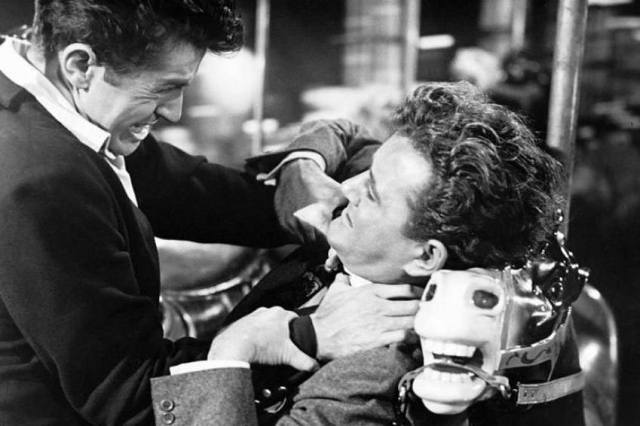
Is free trade good or bad for jobs? It’s a controversial question; in part, because it’s so hard to answer.
According to Krysztof Pelc in the Literary Review of Canada, “there is little academic support for trade agreements having much of an effect on jobs, either up or down”. Indeed, his argument – if I read it correctly – is that trade agreements aren’t really about trade.
To understand what they are about, it’s worth recalling the 1951 classic movie Strangers on a Train (based on the Patricia Highsmith novel of the same name). The plot revolves around a pact between two strangers who each agree to commit a murder on behalf of the other. The theory is that by swapping targets, there will be nothing to connect the killers to their victims, thereby enabling each to literally get away with murder.
The same principle applies to trade agreements – only, in this case, the killers are nation-states and the intended targets are lobby groups within each nation state:
“…trade agreements are about defeating your own worst impulses. And the worst impulse of democratic leaders is to give in to demands from powerful lobbies that help them stay in power, even when it comes at the expense of the rest of the country. “
In his 1965 book, The Logic of Collective Action, the economist Mancur Olson explained how narrow interest groups prevail against the greater good. For a start, it’s easier to organise a small group of individuals than a much larger one. But even more important are the asymetric incentives – in a zero sum conflict between a narrow interest group and the general public, individual members of the former have lot more to gain than individual members of the latter have to lose. Or to put it another way, a small group with a lot at stake is going to fight harder than a large one with less at stake.
Pelc provides a prime example of the nonsense that can result:
“Consider Japan, which has long imposed duties of 778 percent on foreign rice, making the price of rice in Japan multiples higher than in neighbouring countries. That makes growing rice in Japan artificially attractive, so the government also has to pay rice farmers not to do it, so that a third of all fields lie fallow. The system is a significant drag on the economy, but policymakers have been unable to change it, so great is the political power of the rice lobby.”
However, Shinzo Abe, the Japanese PM, is fighting back – with the aid of the Trans-Pacific Partnership (TPP) trade agreement, of which Japan is a member.
In signing up to a general framework of rules that outlaw sweetheart deals for interest groups, a national government not only acquires a perfect way to refuse demands for special favours – it can get other national governments to refuse on its behalf.
Like murderous strangers on a train, trade agreements allow governments to do one another’s dirty work. Still, as long as the lobby groups deserve to be knifed, why should we worry?
The problem is when trade agreements are used not to achieve the common good within each nation, but to allow in-groups to permanently exclude out-groups from influence over policy-making.
For example, mass immigration may be of benefit to the metropolitan elites of a nation, but not to those whose wages are suppressed as a result. If immigration policy is under national control, then conflict may lead to compromise – or at least some form of compensation for those losing out. If, however, free movement is part of an international trade agreement then the winners have a pretext for ignoring the losers.
Except that treating millions of your fellow citizens as if they were a narrow lobby group has a fatal flaw: in a democracy, they have votes.










Join the discussion
Join like minded readers that support our journalism by becoming a paid subscriber
To join the discussion in the comments, become a paid subscriber.
Join like minded readers that support our journalism, read unlimited articles and enjoy other subscriber-only benefits.
Subscribe